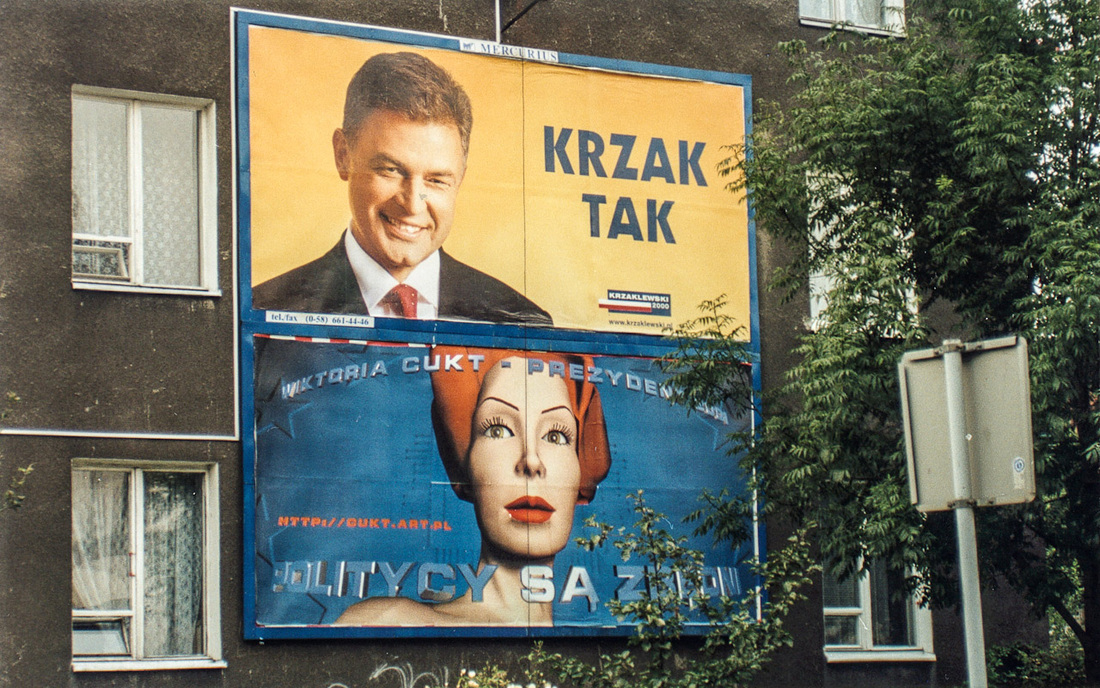Kampania Prezydencka Wiktorii Cukt 2001, C.U.K.T., świat, 1999-2001 / The Presidential Campaign of Wiktoria Cukt 2001, CUKT, world, 1999 - 2001.
CUKT (Technical Culture Central Office) had run a fake election campaign in 2000, scheduled for the entire year of the real presidential election in Poland.CUKT created a candidate for the President of the Republic of Poland, who was not only a young attractive woman, but also a fully virtual, computer-generated being. The campaign of this long-legged beauty started on the internet. The idea was to promote the internet as the tool and institution of a democratic society. But, of course, the artists played with the illusion of democracy. The candidate was perfect for everyone, as she shared every opinion submitted by official website. Her statements were completely contradictory, so as to please every possible voter. This internet project was followed by several election meetings in major Polish cities and Berlin, Chicago. Billboard campaign with AMS, released exactly at the moment when "real" candidates started to present their own ones. This campaign really appealed to the Polish sense of humor, especially when the billboard of Wictoria CUKT was shown, for instance, next to the billboard of President Krzaklewski from the Solidarity Union. Mr. President, whose campaign was based apparently on his attractive look, had no chance against red-haired Wictoria. Regardless, she lost, but so did he.
Foto: P. Wyrzykowski
Ladies and Gentlemen, my name is Wiktoria Cukt.
In December 2000 the term of the current President of the Polish Republic Aleksander Kwaśniewski comes to an end. According to the Constitution of the Polish Republic, article 129 clause 2, the Parliament is obliged to call for an election to chose the new highest official of the country.
This is a unique opportunity to make Poland a truly modern country of an exceptionally high level of cultural and technological development: the Central European “Tiger of Technical Culture”. At the threshold of the 3rd Millennium Poland has a chance to shape its citizens' awareness of modern technology. Thanks to the possibility of electing for president a personality who enjoys absolute knowledge of life in the world of information, and in the prospect of applying this technology to develop electronic democracy, our country faces a great opportunity, which no other country has, or will have in a long time.
We will finally be able to make the idea of truly equal citizens’ rights a reality. Every one of us will be able to express its own opinion on topics crucial to our country and personally participate in the undertaking of all presidential decisions in the Polish Republic. This will be a state in which politicians will become redundant and the system of parliamentary democracy will be transformed into an electronic democracy. The personality who understands the best all the issues of living in the information environment is someone who has grown up in it from its beginnings: a virtual personality.
Realising how great opportunity this might open up for Poland, I am prepared to sacrifice myself and my knowledge for the good of its citizens. Consequently, I am accepting the proposal from the Central Office for Technical Culture, which wants to propose me for the post of the President of the Polish republic.
In order to prepare and carry out an effective electoral campaign, the Victoria Cukt Party will be established and its representatives will be entitled to speak on my behalf, give interviews and present opinions on given issues, before my own official appearances will be made. They will finally create a Citizens Electoral System (OSW) and make it fully operative.
I cordially thank you for support rendered to my person.
Wiktoria Cukt - President of RP 2001
In December 2000 the term of the current President of the Polish Republic Aleksander Kwaśniewski comes to an end. According to the Constitution of the Polish Republic, article 129 clause 2, the Parliament is obliged to call for an election to chose the new highest official of the country.
This is a unique opportunity to make Poland a truly modern country of an exceptionally high level of cultural and technological development: the Central European “Tiger of Technical Culture”. At the threshold of the 3rd Millennium Poland has a chance to shape its citizens' awareness of modern technology. Thanks to the possibility of electing for president a personality who enjoys absolute knowledge of life in the world of information, and in the prospect of applying this technology to develop electronic democracy, our country faces a great opportunity, which no other country has, or will have in a long time.
We will finally be able to make the idea of truly equal citizens’ rights a reality. Every one of us will be able to express its own opinion on topics crucial to our country and personally participate in the undertaking of all presidential decisions in the Polish Republic. This will be a state in which politicians will become redundant and the system of parliamentary democracy will be transformed into an electronic democracy. The personality who understands the best all the issues of living in the information environment is someone who has grown up in it from its beginnings: a virtual personality.
Realising how great opportunity this might open up for Poland, I am prepared to sacrifice myself and my knowledge for the good of its citizens. Consequently, I am accepting the proposal from the Central Office for Technical Culture, which wants to propose me for the post of the President of the Polish republic.
In order to prepare and carry out an effective electoral campaign, the Victoria Cukt Party will be established and its representatives will be entitled to speak on my behalf, give interviews and present opinions on given issues, before my own official appearances will be made. They will finally create a Citizens Electoral System (OSW) and make it fully operative.
I cordially thank you for support rendered to my person.
Wiktoria Cukt - President of RP 2001
Press & magazines
Photos from campaign.


